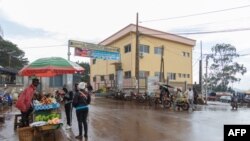Officials in Cameroon have shut down markets in an attempt to stop a wave of cholera infections spreading through all 10 regions of the central African state.
The government says more than 20,000 people have been infected, but the figures may be higher as a majority of the country's 26 million people do not go to hospitals for treatment. Some hospitals are overwhelmed with cholera patients.
Sanitation workers on Friday washed and disinfected toilets, pits and septic tanks at Acacia market in Yaounde's Sixth district.
The market sees at least 5,000 merchants and buyers each day, but district officials say it has been sealed to stop cholera from spreading.
Catherine Mubah Tatah is one of the district's workers.
"When the Ministry of Public Health announced on April 19 that there was a resurgence of cholera, we immediately started telling civilians to boil water before drinking, clean or disinfect their toilets regularly, stop defecating in open spaces and in the bush and to wash all fruits before selling and before consuming the fruits. The fast spread of the disease is an indication that a majority of Cameroonians are not respecting basic cholera prevention steps,” said Tatah.
Tatah said ongoing heavy rains in Yaounde trigger floods that cause breakdowns in the sanitation system and contaminate the environment and water sources.
The Cameroon government says the Mfoundi, Etoudi and Mokolo markets in the capital were also sealed this week to stop the cholera spread.
The government says men between the ages of 21 and 35 years, who constitute a majority of traders, are the most affected by the ongoing wave of infections.
The present wave has affected more than 20,000 people and killed several dozen since April 17, according to the government. Cholera treatment centers like the Djoungolo hospital in Yaounde say they are overwhelmed by an influx of patients.
The government of the central African state says the real number of infections and fatalities may be higher as humanitarian workers are not able to visit more remote towns and villages.
Humanitarian groups say about one-third percent of Cameroon's 26 million people visit hospitals when they are sick. A majority prefer to go to African traditional healers.
Andjembe Essola is the highest government health official along Cameroon's eastern border.
Essola says cholera has also been spreading in Cameroon’s East region that shares a border with the Central African Republic since April 27, when the first cases were detected from travelers that came to the region from Yaounde. Essola says the government is taking measures to ensure that the disease does not reach congested C.A.R. refugee camps.
The government and humanitarian agencies are cleaning the refugee camps, providing clean drinkable water and educating civilians to wash their hands regularly and stop open air defecation.
Cameroon's Public Health ministry says all 10 of the country’s regions have reported the spread of cholera, a bacterial infection that causes severe diarrhea and dehydration, usually spread by eating or drinking contaminated food or water. It can be fatal if not treated in hospitals.
Humanitarian groups say poor and unreliable water supplies in all Cameroonian towns and villages contribute to regular cholera outbreaks.




